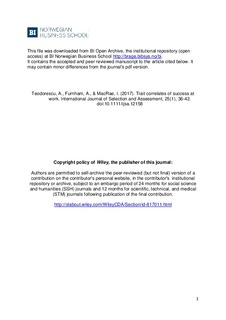Trait correlates of success at work
Journal article, Peer reviewed
Accepted version
Permanent lenke
http://hdl.handle.net/11250/2485550Utgivelsesdato
2017Metadata
Vis full innførselSamlinger
- Publikasjoner fra CRIStin - BI [1015]
- Scientific articles [2181]
Originalversjon
International Journal of Selection and Assessment. 2017, 25 (1), 36-42. 10.1111/ijsa.12158Sammendrag
Purpose: Identifying and developing high potential individuals is fundamental to successful companies and organisations. The present study focuses on the personality traits of high potential individuals. Design: The High Potential Traits Inventory (MacRae, 2012; MacRae & Furnham, 2014) was used to investigate associations between personality traits and subjective and objective measures of career success, in a sample of 383 employed individuals. Findings: Results indicate High Potential Traits Inventory (HPTI) personality traits relate to subjective and objective measures of success with Conscientiousness being the strongest predictor. The findings of the current study are consistent with previous research on High Flyers. Implications: Implications of the current study are discussed, suggesting a clearer operationalization of success is crucial for understanding the underlying mechanisms which lead from personality to potential. Originality/Value: This the validation of a new, robust and succinct measure designed to identify High Flyers in the workplace.
